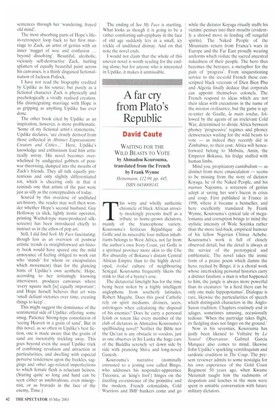Afar cry from Plato's Republic
David Caute
WAITING FOR THE WILD BEASTS TO VOTE by Ahnriadou Kourouma, translated from the French by Frank Wynne Heinemann, £12.99, pp. 445, ISBN 0434008141 This witty and wholly authentic chronicle of black African atrocity mockingly presents itself as a tribute to home-grown dictators, mainly of the francophone variety. Kourouma's fictitious Republique de Golfe and its miserable four million inhabitants belongs to West Africa, not far from the author's own Ivory Coast, yet Golfe is a spiritual province more akin to the Ubu Roi absurdity of Bokassa's distant Central African Empire than to the highly developed, evolue culture of neighbouring Senegal. Kourouma frequently likens the stink to that of a hyena's arse.
The dictatorial limelight has for the time being been stolen by a highly intelligent anglophone from southerly latitudes, Robert Mugabe. Does this good Catholic rely on spirit mediums, diviners, seers, astrologers when calculating the disposal of his enemies? Does he carry a personal fetish or totem like every member of the club of dictators in Ahmadou Kourouma's spellbinding novel? Neither the Bible nor the Qu'ran is any obstacle to voodoo, just as one observes in Sri Lanka the huge ears of the Buddha serenely set down side by side with prancing Shiva and long-nosed Ganesh.
Kourouma's narrative (nominally entrusted to a jesting sora called Bingo, who addresses his responder-apprentice Tiecoura, as 'king's fool') hinges on the dazzling co-existence of the primitive and the modern. French colonialists, Cold Warriors and IMF bankers come and go
while the dictator Koyaga ritually stuffs his victims' penises into their mouths (evidently a shrewd move in fending off vengeful spirits). The Naked People of the Mountains return from France's wars in Europe and the Far East proudly wearing uniforms which violate the sacred ancestral nakedness of their people. The hero thus becomes the betrayer, a metaphor for the pain of 'progress'. From unquestioning service to the ice-cold French these conscripted black veterans of Dien Bien Phu and Algeria finally deduce that corporals can appoint themselves colonels. The French respond to ideas which are not their ideas with executions in the name of the mission eivilisatrice, but the game is up: re-enter de Gaulle, in main tendue, followed by the agents of an irrelevant Cold War, determined to divide Africa between phoney 'progressive' regimes and phoney democracies waiting for the wild beasts to vote — as indeed they recently did in Zimbabwe, to their cost. Africa will henceforward belong to Mobutu, Amin, the Emperor Bokassa, his fridge stuffed with human limbs.
Mind you, propitiatory cannibalism — as distinct from mere emasculation — seems to be missing from the story of dictator Koyaga, he of the Naked People, and his maman Najouma, a sorceress of genius adept at saving her son's bacon in crisis and coup. First published in France in 1998, where it became a bestseller, and here excellently translated by Frank Wynne, Kourouma's cynical tale of megalomania and corruption brings to mind the stylistic intensity of Wole Soyinka rather than the more laid-back, empirical humour of his fellow Nigerian Chinua Achebe. Kourouma's work is full of closely observed detail, but the detail is always at the service of the prototypical and emblematic. The novel takes the ironic form of a praise poem which damns the hero, recited by Bingo; it is a choral work whose interlocking personal histories carry a distinct fatalism: a man is what happened to him, the jungle is always more powerful than its creatures: 'in a herd there can be only one male hippopotamus'. Dialogue is rare, likewise the particularities of speech which distinguish characters in the AngloSaxon tradition, Chapters routinely end in adages, sometimes amusing, occasionally tedious: 'When the partridge takes flight, its fledgling does not linger on the ground.'
Now in his seventies, Kourouma has justly been likened to Voltaire by Le Nouvel Observateur. Gabriel Garcia Marquez also comes to mind, likewise John Updike's sparkling ventriloquism and sardonic erudition in The Coup. The present reviewer admits to some nostalgia for his own experience of the Gold Coast Regiment 50 years ago, when Kvvame Nkrurnah taught him the rudiments of despotism and lunches in the mess were spent in amiable conversation with future military dictators.


































































 Previous page
Previous page